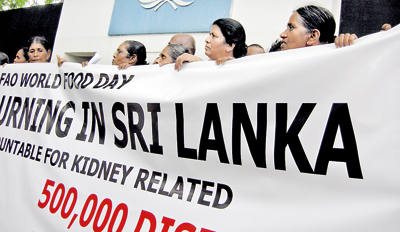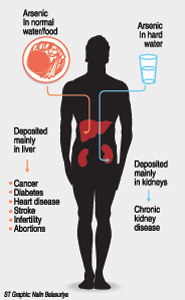News
FAO blamed for spread of chronic kidney disease
Farmers from the North Central Province staged a protest in front of the Food and Agriculture Organisation office (FAO) in Bauddhaloka Mawatha, claiming the FAO was encouraging the promotion of chemical fertiliser. The protest coincided with World Food Day, which fell on Tuesday, October 16.

Protest outside the FAO office in Bauddhaloka Mawatha. Pix by Athula Devapriya
The Swarna Hansa Foundation, which organised the protest, accuses the FAO of supporting multinational fertiliser companies that promote the use of chemical fertiliser.
“There are more than 50,000 chronic kidney disease patients in the country, and many are dying because of pesticides introduced by the FAO,” said Swarna Hansa spokesperson Gallage Punyawardena.
“We demand compensation for farmers suffering from the disease, and we demand that the authorities ban the import of chemical fertiliser with immediate effect.”
It has been found that chemical fertilisers containing metalloids (metal-like elements) such as arsenic and cadmium have contributed to the spread Chronic Kidney Disease (CKD) in the North Central Province. Contaminated water resources have led to an estimated 85 per cent of farmers in the area getting the disease.
Mr. Gallage told the Sunday Times that the FAO was responsible for the deaths of farmers stricken with chronic kidney disease.
Matale farmer Justin Peris said fertiliser companies were deceiving farmers by promoting dangerous products, that the majority of the farmers in the province were suffering from kidney disease, and that these farmers should be compensated.
Meanwhile, Sri Lankas FAO representative Patrick. T. Evans told the Sunday Times that scientific studies were under way to determine the exact cause of the disease, which has been reported in four other countries, including India.

“The FAO has never promoted any chemical fertilizer,” Mr. Evans said. “In fact, what we promote is organic fertiliser usage and organic methods of farming. Certainly, the government should impose controls on the import of chemical fertiliser,” he said.
Research team calls for controls on fertilizer import and use
The prevalence of hard water, or water with high mineral content, could be contributing to the spread of chronic kidney disease in the North Central Province, says a team of Sri Lankan academics.
The team comprising Professor Priyani Paranagama, Professor of Chemistry, University of Kelaniya, and Dr. M. A. C. S. Jayasumana, University of Rajarata, has conducted research on the spread of chronic kidney disease in the province.
Prof. Paranagama said chemical fertiliser such as triple super phosphate contained a high level of arsenic, and water that was extra “hard” attracted a high level of metalloid content.
Dr. Jayasumana said that when these substances enter the body through hard water, the metalloid particles are deposited in the kidney, resulting in chronic kidney disease. When metalloid particles enter the body through normal water or food, they are deposited in the liver, where they could cause diabetes, cancer, heart disease, stroke, abortions and infertility.
The team presented its findings at a meeting with officials of the Ministry of Agriculture and the Department of Agriculture. The researchers made the following proposals:
– That the state should ban the import of fertiliser containing arsenic, cadmium and other metalloids, as decided by the Pesticides Technical and Advisory Committee (PTAC);
– That the state should monitor the import, distribution and sale of chemical fertiliser;– That agriculture experts should examine crops, prescribe pesticides or fertiliser, and monitor the use of fertiliser;
– That the state should ensure a complete ban on triple super phosphate, which has the highest arsenic content among fertilisers;
– That a national laboratory be set up to test fertiliser samples before the fertiliser is distributed to farmers.
Follow @timesonlinelk
comments powered by Disqus

























